Mom, Dad, relax — no, not really. I just awoke from a particularly vivid dream after a great dinner with friends, a walk through a drunken throng of hockey fans, and having read a few chapters of Robopocalypse just before sleeping.
My husband and I found ourselves in a prison. A panopticon, but with chutes, ladders, padded tunnels, statuesque Stoßtruppen of both genders, and a complex system of rewards, punishments, and complex behavioural modification programs. The system caused you to gravitate towards pods of twelve inmates with whom you would serve out your term.
We arrived, and immediately Adolfo intervened in a conflict and saved a woman's life. For this, he was rewarded with a bag of clay, which, not understanding the significance of the gift, we left behind. Shortly we were introduced to our area where we were faced with a bewildering set of strange customs, conflicts, and rewards - a cushion which grants you the right to use a chair, a locker opened by blowing on a tube, a news room where you earned your dinner by voting on videos, and strange acquisitive and consumerist rules seemingly designed to break down social cohesion (which were enforced by the Voice of God).
After a time, we landed in a good pod, with amazing people who committed to look out for one other — carrying each other through particularly difficult terrain drills, holding each other through vomiting spells, and sharing our resources in contravention of the VOG. In the ensuing jailbreak, we took care of each other, throwing away our location- and activity-monitoring devices and helping each other identify the friendly prison guards who could help us to the tunnels leading to escape.
It all went beautifully until we encountered a slight routing bug in the padded transport tunnels, which caused us to merge into a stream of inmates who were headed for reprocessing. Reprocessing meant we were atomized and reconstituted as breakfast cereal. In the afterlife, we stood around drinking fruity breakfast cereal cocktails and agreed that it was a good life, and we looked forward to the next.
Showing posts with label books. Show all posts
Showing posts with label books. Show all posts
11 Jun 2011
17 Jun 2010
Darwin's Bastards

People who know almost nothing about what they're talking about are often more enthusiastic than the ones who know a lot, so they do all the talking, while the ones who know their shit stay silent and get red in the face.— Sheila Heti, in There Is No Time In Waterloo
Darwin's Bastards is a very high quality collection of science fiction. It's so good that it doesn't even bill itself as being all Canadian. ISBN 978-1-55365-492-6. Well worth the read.
13 Jun 2009
Vancouver's Open Data, Open Standards, Open Source and the Vancouver Public Library
Vancouver has adopted a policy of Open Data, Open Standards, Open Source and I'm really excited about it. David Ascher presented on the topic at Open Web Vancouver 2009 and pointed out that if we don't engage the city and use this data it will go nowhere.
The Vancouver Public Library is one of my favourite places. I love libraries, I love books, but the library here in Vancouver is a really special library for me. So I've been thinking of ways that the library could share data so that I could build applications to make the library more interesting and more valuable to the people of the city.
Here's some data I'd like to have:
The Vancouver Public Library is one of my favourite places. I love libraries, I love books, but the library here in Vancouver is a really special library for me. So I've been thinking of ways that the library could share data so that I could build applications to make the library more interesting and more valuable to the people of the city.
Here's some data I'd like to have:
- Books on order
I'd like to know what new books are currently on order, but not available. I want a preview of coming attractions.
- Most unpopular books
What doesn't get checked out? What's likely to get sold in the next round of disposal, ahem, book sale?
- Most popular books
What's everybody reading?
- Top 100 sites for library patrons
What are the most popular sites browsed from the library? I'd like to be able to contrast this with the most popular sites according to Alexa. That should help tell the library what sorts of services patrons need.
Labels:
books,
freedom,
government,
innovation,
mashup,
opensource,
policy,
software,
vancouver,
web2
7 Oct 2008
Just what is the freaking deal with Henry freaking James lately?
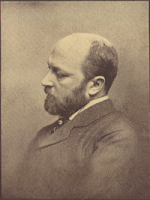 Having just finished The Conversion by Joseph Olshan, I find that a plethora, a torrent, a veritable cornucopia of recent gay lit seems to revolve around Henry James, "The Master".
Having just finished The Conversion by Joseph Olshan, I find that a plethora, a torrent, a veritable cornucopia of recent gay lit seems to revolve around Henry James, "The Master".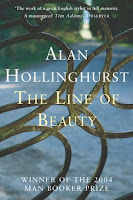 Well, three books anyhow, but three books mark a trend. The first I noticed was the most Jamesian (and by far the best), Alan Hollinghurst's 2004 novel The Line of Beauty. Chronicling upper-class life in Thatcher's Britain, Hollinghurst earned the Booker Prize. His first book The Swimming Pool Library was powerfully charged with social commentary, but The Line of Beauty was stunning, and all about the Henry James.
Well, three books anyhow, but three books mark a trend. The first I noticed was the most Jamesian (and by far the best), Alan Hollinghurst's 2004 novel The Line of Beauty. Chronicling upper-class life in Thatcher's Britain, Hollinghurst earned the Booker Prize. His first book The Swimming Pool Library was powerfully charged with social commentary, but The Line of Beauty was stunning, and all about the Henry James.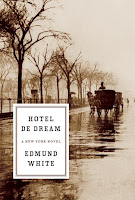 Next up: Edmund White's 2007 novel Hotel de Dream in which Henry James appears as the villain. A riveting semi-fictional tale of Stephen Crane's last days from his wife's point of view, it echoes some of the death themes White first explored in The Married Man, echoing Paul Bowles' The Sheltering Sky. Although I prefer White's biographical novels, particularly The Beautiful Room is Empty, this is my favourite of his historical fictions thus far.
Next up: Edmund White's 2007 novel Hotel de Dream in which Henry James appears as the villain. A riveting semi-fictional tale of Stephen Crane's last days from his wife's point of view, it echoes some of the death themes White first explored in The Married Man, echoing Paul Bowles' The Sheltering Sky. Although I prefer White's biographical novels, particularly The Beautiful Room is Empty, this is my favourite of his historical fictions thus far.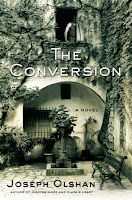 And finally, back to Joseph Olshan's The Conversion. It is also part of a recent spate of young-gay-Italian-American-Jew-under-a-loggia fiction that is clogging summer bookshelves from Provincetown to Fire Island (but I digress). The Conversion is chock full of Jamesian references, ranging from explicit mentions to flaming manuscripts to the aforementioned loggias. But it surprised me with its layered subtlety and insightful parallels, and it kept me guessing until the end.
And finally, back to Joseph Olshan's The Conversion. It is also part of a recent spate of young-gay-Italian-American-Jew-under-a-loggia fiction that is clogging summer bookshelves from Provincetown to Fire Island (but I digress). The Conversion is chock full of Jamesian references, ranging from explicit mentions to flaming manuscripts to the aforementioned loggias. But it surprised me with its layered subtlety and insightful parallels, and it kept me guessing until the end.Apparently part of the maturity of gay fiction is the rediscovery of the canonical figures from the mainstream whose gay subtexts were so very circumspect. At the same time, gay fiction has entered the mainstream and exists less and less as a separate genre (just try finding a section in a bookstore anymore). Eighty-eight years after his death, Henry James seems to be the model for gay fiction to come. Or maybe some excitable queens are taking the whole "Master" thing just a little bit too close to heart.
1 Sept 2008
Saturn's Children: an homage to Friday
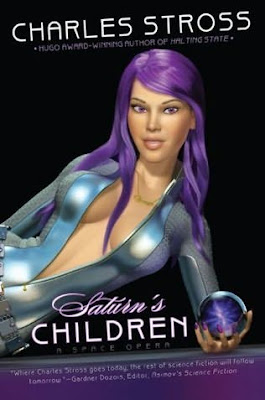 Charles Stross was a bit embarrassed about the cover to his new book Saturn's Children. Charlie's a stand-up guy: he cares about people, women specifically, and I think he was worried people would think he was a creepy lech. But this book is about a lonely sexbot, and the cover doesn't just stand on its own: the book is a tribute to Robert A. Heinlein's Friday, and so is the cover. The book has an engaging milieu and a somewhat bewildering set of characters (personality versioning is hard to keep track of) and Stross maintains the pace and keeps the story moving. It's a good read, and a nice departure from the usual strong-AI-ate-my-balls story lines. It's packed with obscure Heinlein references and in-jokes:
Charles Stross was a bit embarrassed about the cover to his new book Saturn's Children. Charlie's a stand-up guy: he cares about people, women specifically, and I think he was worried people would think he was a creepy lech. But this book is about a lonely sexbot, and the cover doesn't just stand on its own: the book is a tribute to Robert A. Heinlein's Friday, and so is the cover. The book has an engaging milieu and a somewhat bewildering set of characters (personality versioning is hard to keep track of) and Stross maintains the pace and keeps the story moving. It's a good read, and a nice departure from the usual strong-AI-ate-my-balls story lines. It's packed with obscure Heinlein references and in-jokes:"Why bother learning all that biochemistry stuff—or how to design a building, or conn a boat, or balance accounts, or solve equations or comfort the dying—when you can get other people to do all that for you in exchange for a blow job?"an inversion of a fatuous quote by Lazarus Long in Time Enough for Love
 Friday was one of my favourite Heinlein books: for a nerdy gay teenager, an oppressed bicurious gengineered courtesan spy was terribly compelling; plus she was black (covers lie), and she traveled the world in semiballistic missiles, tumbling into bed with various exciting characters of various genders. At the time young-adult fiction didn't really speak to gay kids; at that time gay fiction was exclusively boomers talking to their contemporaries about AIDS and Fire Island (not to say that I didn't devour those books, but they didn't mean as much to then as they do now). At the same time I was obsessed by comic books, particularly the New Mutants, teenagers who were hated and oppressed because their secret mutant powers manifested themselves at puberty. So for a science-fiction-obsessed gay boy, Friday presented a character with whom I could identify.
Friday was one of my favourite Heinlein books: for a nerdy gay teenager, an oppressed bicurious gengineered courtesan spy was terribly compelling; plus she was black (covers lie), and she traveled the world in semiballistic missiles, tumbling into bed with various exciting characters of various genders. At the time young-adult fiction didn't really speak to gay kids; at that time gay fiction was exclusively boomers talking to their contemporaries about AIDS and Fire Island (not to say that I didn't devour those books, but they didn't mean as much to then as they do now). At the same time I was obsessed by comic books, particularly the New Mutants, teenagers who were hated and oppressed because their secret mutant powers manifested themselves at puberty. So for a science-fiction-obsessed gay boy, Friday presented a character with whom I could identify. Cory Doctorow has spoken a great deal about why he chose to write Little Brother, a young adult novel about technology and totalitarianism. He read Heinlein when he was a boy: he explained that young people are very idealistic and looking for different ways of looking at the world. Friday did that for me, but I don't think of Saturn's Children as a young-adult book: it is more of a story-driven contemplation on the evolution of identity with technology. The references to Friday are creative and amusing, and the contrast between the two stories shows how the shape of the future has changed over the past twenty-five years. Saturn's Children is seemingly addressed to people of Charlie's (and my) generation.
2 Aug 2008
Bookshelf: Adam Haslett's You are not a stranger here

I randomly picked up Adam Haslett's You are not a stranger here off the used bookshelf at Little Sister's. The National Book Award Finalist sticker caught my eye, and I said, "eh, why not?" After all, I liked the cover.
Th book contains nine short stories; several are written in a British idiom, and his writing reminds me favourably of an early David Leavitt. The first story Notes to my biographer really caught my attention, and the story Divination gave me a night's dreams. On the whole, a highly satisfying read, and an author that I'll be watching for more.
Also, today I stumbled upon Google Book Search – much like the library feature in BookMooch, or Library Thing, or Amazon's bookshelf, or Shelfari, or Déjà lu (which still isn't released). After missing the boat, I'm missing the train, the bus, the plane, and even the stagecoach and the jitney.
23 Jun 2008
Undiplomatic behaviour
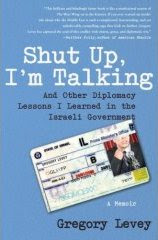 Gregory Levey, a columnist for Salon.com, spins a good yarn about his time working for the Israeli government as a speechwriter in his book "Shut Up, I'm Talking: And Other Diplomacy Lessons I Learned in the Israeli Government". He gives a great view of the other side of politics and diplomacy, and tells a couple of really funny stories. I was a bit jealous of his experiences, though not so much when he described daily life in Tel Aviv.
Gregory Levey, a columnist for Salon.com, spins a good yarn about his time working for the Israeli government as a speechwriter in his book "Shut Up, I'm Talking: And Other Diplomacy Lessons I Learned in the Israeli Government". He gives a great view of the other side of politics and diplomacy, and tells a couple of really funny stories. I was a bit jealous of his experiences, though not so much when he described daily life in Tel Aviv.
4 Jun 2008
Tales of the City
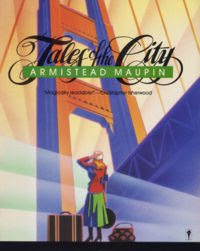 I've read Armistead Maupin's Tales of the City almost as many times as I've read The Lord of the Rings. At times it was a vice, honestly... it seemed like every semester in university the week before final exams I'd dig into these volumes instead of studying. Alternately silly and tragic, the books now span thirty years. As much as I sometimes malign the cultural accomplishments of the boomers, these books chronicle some of the best stories of the generation.
I've read Armistead Maupin's Tales of the City almost as many times as I've read The Lord of the Rings. At times it was a vice, honestly... it seemed like every semester in university the week before final exams I'd dig into these volumes instead of studying. Alternately silly and tragic, the books now span thirty years. As much as I sometimes malign the cultural accomplishments of the boomers, these books chronicle some of the best stories of the generation.The latest volume, Michael Tolliver Lives, brings us up-to-date with the San Francisco clan, and is flavoured with not a little of Maupin's current love life (it feels by far the most autobiographical of his books) and is once again focused mostly on the title character. His writing has lost a fair bit of its satirical sting, but the depth of characterizations has improved, as has his subtelty. The sympathy with which he depicts his characters' internal conflict is more moving than ever. And although he leaves it open ended, this book feels like closure, which makes me rather sad – but honestly, I'm very pleased because I never even expected to see it written, and by all indications Maupin never expected to write it, either.
7 May 2008
Teach kids to question authority
I just finished reading Cory Doctorow's Little Brother: a very dangerous book to pick up in the late evening. It is a young adult book about teenage hackers who bring down police-state security regime enforced by the U.S. Department of Homeland Security following a terrorist attack and restore the Bill of Rights.
 Fiction, unfortunately. This is fine reading for young people: exciting, subversive, relevant, and extremely motivating with real-world ideas about things they can do to change the world they live in.
Fiction, unfortunately. This is fine reading for young people: exciting, subversive, relevant, and extremely motivating with real-world ideas about things they can do to change the world they live in.
I'm one of Cory Doctorow's 1,000 true fans. The man shames me; he's written the most patriotic book I've read in years – a veritable pæan to the rights and freedoms guaranteed by the U.S. constitution – and he's Canadian. It wasn't easy for me to leave my country of birth, and it is all too tempting to turn my back on it; this book reminds me that the United States once stood for principles worth fighting for, and with work, it could someday again.
The book is available for sale as a dead tree and as a DRM-free audiobook, as well as a freely downloadable CC-licensed text|html|PDF file – and if you downloaded it, liked it, and want him to get paid for it, donate a copy to a library or school.
 Fiction, unfortunately. This is fine reading for young people: exciting, subversive, relevant, and extremely motivating with real-world ideas about things they can do to change the world they live in.
Fiction, unfortunately. This is fine reading for young people: exciting, subversive, relevant, and extremely motivating with real-world ideas about things they can do to change the world they live in.I'm one of Cory Doctorow's 1,000 true fans. The man shames me; he's written the most patriotic book I've read in years – a veritable pæan to the rights and freedoms guaranteed by the U.S. constitution – and he's Canadian. It wasn't easy for me to leave my country of birth, and it is all too tempting to turn my back on it; this book reminds me that the United States once stood for principles worth fighting for, and with work, it could someday again.
The book is available for sale as a dead tree and as a DRM-free audiobook, as well as a freely downloadable CC-licensed text|html|PDF file – and if you downloaded it, liked it, and want him to get paid for it, donate a copy to a library or school.
14 Mar 2008
Atheism as fundamentalism
Author Chris Hedges has been a mideast correspondent for years, and last year wrote a scathing book about religious fundamentalism in the United States (American Fascists: The Christian Right and the War On America). This year he has a new target: the New Atheists – Richard Dawkins, Sam Harris, and Christopher Hitchens – who he accuses of being just as dangerous as religious fundamentalists. The book is called I Don't Believe in Atheists.
That Hedges set his sights in this direction is hardly any surprise, as the New Atheists often unleash their most withering criticism on religious moderates who they say provide cover for religious fundamentalists, and who want to have their cake and eat it too. Since Hedges graduated from Harvard Divinity and is by his own account a religious moderate, it makes sense that he would want to answer this charge. I am curious to learn more, as from a recent review and interview I was able to grasp neither the logic of the title (I think it fails both as a joke and as a teleological argument) nor the full crux of his thesis. Certainly Christopher Hitchens is a blowhard (on that anyone but Hitchens would agree), but the arguments against Harris and Dawkins are more subtle. It seems to rest on the attitudes of atheist superiority and utopianism.
I am not an atheist, nor an atheist Utopian: I've never thought that atheism will inevitably lead to a better society, and I see atheism as a smug nihilist mirror image of other religions. I must admit to feeling a certain amount of agnostic superiority, in part because agnosticism, like vegetarianism, can be a bitch to maintain: it has the neither the certitude nor the comfort of religion or atheism. I argue most strongly that faith should never be used to form law or public policy, as it is by nature untestable and subjective, and because I usually see faith as a weapon wielded against outsiders such as myself. Although I understand the comfort faith gives, on the balance I tend to focus on the other side: being a target can have that effect.
I'm looking forward to reading this book. The superiority angle is one that I particularly want to examine. Being ratherrealistic pessimistic about human nature means that I'm no sort of Utopian whatsoever. My gut tells me that the faith impulse is a bug in human cognition: possibly a necessary bug, but a bug nonetheless. Of course, since I can't prove that argument I'll have to ask you to take it on faith.
That Hedges set his sights in this direction is hardly any surprise, as the New Atheists often unleash their most withering criticism on religious moderates who they say provide cover for religious fundamentalists, and who want to have their cake and eat it too. Since Hedges graduated from Harvard Divinity and is by his own account a religious moderate, it makes sense that he would want to answer this charge. I am curious to learn more, as from a recent review and interview I was able to grasp neither the logic of the title (I think it fails both as a joke and as a teleological argument) nor the full crux of his thesis. Certainly Christopher Hitchens is a blowhard (on that anyone but Hitchens would agree), but the arguments against Harris and Dawkins are more subtle. It seems to rest on the attitudes of atheist superiority and utopianism.
I am not an atheist, nor an atheist Utopian: I've never thought that atheism will inevitably lead to a better society, and I see atheism as a smug nihilist mirror image of other religions. I must admit to feeling a certain amount of agnostic superiority, in part because agnosticism, like vegetarianism, can be a bitch to maintain: it has the neither the certitude nor the comfort of religion or atheism. I argue most strongly that faith should never be used to form law or public policy, as it is by nature untestable and subjective, and because I usually see faith as a weapon wielded against outsiders such as myself. Although I understand the comfort faith gives, on the balance I tend to focus on the other side: being a target can have that effect.
I'm looking forward to reading this book. The superiority angle is one that I particularly want to examine. Being rather
27 Feb 2008
Themepunks coming?
Thirty months ago Salon.com serialized the first third of a novel-in-progress by Cory Doctorow: Themepunks. Set mostly in the near future in the dire swamps of Florida, the work is sprinkled with post-post-industrial economic upheaval, technical and medical wackiness. I enjoyed it a great deal, but kept anticipating for the rest: it left me hanging. Last night, kept awake by cold remedies, I browsed the contents of my ebook repository, popped open my copy of the first installment, and tore through it (nighttime cold relief my aching back). Since I keep up with Mr. Doctorow, I knew it hadn't been released, but wondered, so I searched, and lo: it will apparently be released 1 Jan 2009 by Tor (hardcover, 416 pages, ISBN 0765312794). That's too long to wait.
I am an inveterate Cory fanboy. Of course I'm hooked on BoingBoing, where Cory provides the best posts and I always read the excellent columns he produces. His books and short stories never come out often enough for my tastes, and his podcast has gone sadly silent. He'd better get cracking and turn out more stuff or one of these days I'm going to have to dust off the slash fiction I wrote featuring him and Jack Valenti.
Update: Cory is publishing a book based on this work called Makers for release in November 2009, serialized weekly starting now at Tor.com.
2nd update:Makers has been published, and is available at craphound.com/makers. Cory's best work yet, highly recommended.
I am an inveterate Cory fanboy. Of course I'm hooked on BoingBoing, where Cory provides the best posts and I always read the excellent columns he produces. His books and short stories never come out often enough for my tastes, and his podcast has gone sadly silent. He'd better get cracking and turn out more stuff or one of these days I'm going to have to dust off the slash fiction I wrote featuring him and Jack Valenti.
Update: Cory is publishing a book based on this work called Makers for release in November 2009, serialized weekly starting now at Tor.com.
2nd update:Makers has been published, and is available at craphound.com/makers. Cory's best work yet, highly recommended.
26 Feb 2008
Spooky
I finally got to read Spook Country, 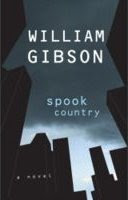 William Gibson's latest novel (a delay due to last year's municipal strike). By far his most politically relevant to date, it is set in the recent past, combining spyjinks, geek chic, nouveaux ethnic groups, and his usual theme of "lowlife meets high-tech". I especially enjoyed seeing my adopted city illustrated so vividly. The plot, while mundane, does not fail to surprise: strong characterizations and interesting plot devices keep the story humming along nicely. Without spoiling it, there is a satisfying tie-in to recent world events and reactions to them.
William Gibson's latest novel (a delay due to last year's municipal strike). By far his most politically relevant to date, it is set in the recent past, combining spyjinks, geek chic, nouveaux ethnic groups, and his usual theme of "lowlife meets high-tech". I especially enjoyed seeing my adopted city illustrated so vividly. The plot, while mundane, does not fail to surprise: strong characterizations and interesting plot devices keep the story humming along nicely. Without spoiling it, there is a satisfying tie-in to recent world events and reactions to them.
 William Gibson's latest novel (a delay due to last year's municipal strike). By far his most politically relevant to date, it is set in the recent past, combining spyjinks, geek chic, nouveaux ethnic groups, and his usual theme of "lowlife meets high-tech". I especially enjoyed seeing my adopted city illustrated so vividly. The plot, while mundane, does not fail to surprise: strong characterizations and interesting plot devices keep the story humming along nicely. Without spoiling it, there is a satisfying tie-in to recent world events and reactions to them.
William Gibson's latest novel (a delay due to last year's municipal strike). By far his most politically relevant to date, it is set in the recent past, combining spyjinks, geek chic, nouveaux ethnic groups, and his usual theme of "lowlife meets high-tech". I especially enjoyed seeing my adopted city illustrated so vividly. The plot, while mundane, does not fail to surprise: strong characterizations and interesting plot devices keep the story humming along nicely. Without spoiling it, there is a satisfying tie-in to recent world events and reactions to them.
Wilson disappoints
After gushing recently about Robert Charles Wilson, I was thrilled that Axis, the sequel to his Hugo-winning novel Spin, had been reserved for me at the library. .jpg) I dug in, and... well... it really disappointed; this one won't be taking any awards. Spin had big ideas and great plot tension, but Axis got all wound up and didn't really go anywhere interesting, with slightly wooden characters, a retread plot, and a maguffin that was a total letdown. Better luck next time, Mr. Wilson – maybe a sequel wasn't such a great idea.
I dug in, and... well... it really disappointed; this one won't be taking any awards. Spin had big ideas and great plot tension, but Axis got all wound up and didn't really go anywhere interesting, with slightly wooden characters, a retread plot, and a maguffin that was a total letdown. Better luck next time, Mr. Wilson – maybe a sequel wasn't such a great idea.
Honestly, at times I was a bit confused, thinking I had already read it because it was so similar to Charles Stross's Missile Gap. It had the same lost-continent-on-another-planet shtick, the same weird things popping up out of the sand, and the same pointless roadtrip seasoned with marital strife. But Charlie used those elements to fashion a good story.
.jpg) I dug in, and... well... it really disappointed; this one won't be taking any awards. Spin had big ideas and great plot tension, but Axis got all wound up and didn't really go anywhere interesting, with slightly wooden characters, a retread plot, and a maguffin that was a total letdown. Better luck next time, Mr. Wilson – maybe a sequel wasn't such a great idea.
I dug in, and... well... it really disappointed; this one won't be taking any awards. Spin had big ideas and great plot tension, but Axis got all wound up and didn't really go anywhere interesting, with slightly wooden characters, a retread plot, and a maguffin that was a total letdown. Better luck next time, Mr. Wilson – maybe a sequel wasn't such a great idea.Honestly, at times I was a bit confused, thinking I had already read it because it was so similar to Charles Stross's Missile Gap. It had the same lost-continent-on-another-planet shtick, the same weird things popping up out of the sand, and the same pointless roadtrip seasoned with marital strife. But Charlie used those elements to fashion a good story.
Naomi Klein connects the dots
I recently picked up Naomi Klein's No Logo – a seminal work by all accounts, and although I tried, I found myself impatiently paging through it, looking for the fresh insight that I had always heard it offered.  All I saw were things I already knew about the effects of corporatism and globalization, and the negative effects these trends are having on our health and communities. I realized that the reason these concepts didn't seem very interesting was because they have become such an understood part of our culture's understanding of our new economy that it has become completely internalized. If I had read this in 2000 I might have helped trash a Starbucks in Seattle; today it feels like history.
All I saw were things I already knew about the effects of corporatism and globalization, and the negative effects these trends are having on our health and communities. I realized that the reason these concepts didn't seem very interesting was because they have become such an understood part of our culture's understanding of our new economy that it has become completely internalized. If I had read this in 2000 I might have helped trash a Starbucks in Seattle; today it feels like history.
The Shock Doctrine, on the other hand, is very much in touch with the concerns and mystery of the times. Klein explains how the neoliberal/neoconservative revolutions of the past 25 years, from Chile through Iraq, are traced to Milton Friedman's Chicago School.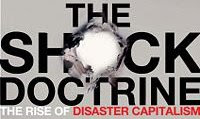 She explains why governments resort to torture, and long after shock therapy had been thoroughly discredited in psychiatric medicine, it was being applied to economies throughout the world to enable a mass transfer of wealth to the already wealthy elite, undoing the socialist movement of the early 20th century. Klein introduced the concept of disaster capitalism: whenever a disaster strikes (whether accidental or engineered), corporations put plans into operation to raid public treasuries and public trusts while the public is still in a state of shock; she also warns that huge industries have emerged to deal with these catastrophes, and are dependent upon continued disasters for growth. Klein argues that our societies need to become educated to resist this type of manipulation so the next time something bad happens we won't surrender to corporate greed.
She explains why governments resort to torture, and long after shock therapy had been thoroughly discredited in psychiatric medicine, it was being applied to economies throughout the world to enable a mass transfer of wealth to the already wealthy elite, undoing the socialist movement of the early 20th century. Klein introduced the concept of disaster capitalism: whenever a disaster strikes (whether accidental or engineered), corporations put plans into operation to raid public treasuries and public trusts while the public is still in a state of shock; she also warns that huge industries have emerged to deal with these catastrophes, and are dependent upon continued disasters for growth. Klein argues that our societies need to become educated to resist this type of manipulation so the next time something bad happens we won't surrender to corporate greed.
Mexican director Alfonso Cuarón produced this short film to introduce the concepts and arguments used in the book.
Ms. Klein's work is having a real impact on our society. No Logo is credited with inspiring the Battle of Seattle; The Shock Doctrine is just beginning to filter into our mass consciousness, and I look forward to the effect it will have on our polity.
 All I saw were things I already knew about the effects of corporatism and globalization, and the negative effects these trends are having on our health and communities. I realized that the reason these concepts didn't seem very interesting was because they have become such an understood part of our culture's understanding of our new economy that it has become completely internalized. If I had read this in 2000 I might have helped trash a Starbucks in Seattle; today it feels like history.
All I saw were things I already knew about the effects of corporatism and globalization, and the negative effects these trends are having on our health and communities. I realized that the reason these concepts didn't seem very interesting was because they have become such an understood part of our culture's understanding of our new economy that it has become completely internalized. If I had read this in 2000 I might have helped trash a Starbucks in Seattle; today it feels like history.The Shock Doctrine, on the other hand, is very much in touch with the concerns and mystery of the times. Klein explains how the neoliberal/neoconservative revolutions of the past 25 years, from Chile through Iraq, are traced to Milton Friedman's Chicago School.
 She explains why governments resort to torture, and long after shock therapy had been thoroughly discredited in psychiatric medicine, it was being applied to economies throughout the world to enable a mass transfer of wealth to the already wealthy elite, undoing the socialist movement of the early 20th century. Klein introduced the concept of disaster capitalism: whenever a disaster strikes (whether accidental or engineered), corporations put plans into operation to raid public treasuries and public trusts while the public is still in a state of shock; she also warns that huge industries have emerged to deal with these catastrophes, and are dependent upon continued disasters for growth. Klein argues that our societies need to become educated to resist this type of manipulation so the next time something bad happens we won't surrender to corporate greed.
She explains why governments resort to torture, and long after shock therapy had been thoroughly discredited in psychiatric medicine, it was being applied to economies throughout the world to enable a mass transfer of wealth to the already wealthy elite, undoing the socialist movement of the early 20th century. Klein introduced the concept of disaster capitalism: whenever a disaster strikes (whether accidental or engineered), corporations put plans into operation to raid public treasuries and public trusts while the public is still in a state of shock; she also warns that huge industries have emerged to deal with these catastrophes, and are dependent upon continued disasters for growth. Klein argues that our societies need to become educated to resist this type of manipulation so the next time something bad happens we won't surrender to corporate greed.Mexican director Alfonso Cuarón produced this short film to introduce the concepts and arguments used in the book.
Ms. Klein's work is having a real impact on our society. No Logo is credited with inspiring the Battle of Seattle; The Shock Doctrine is just beginning to filter into our mass consciousness, and I look forward to the effect it will have on our polity.
5 Feb 2008
Cheerleader of the Apocalypse
![Lenie Clarke, [anti-]heroine of the Rifters trilogy](https://blogger.googleusercontent.com/img/b/R29vZ2xl/AVvXsEgGOYLKHhvfevSwOuHIquaKKixKBM8LMU8ZZUqmg9pB3KIvrcgjVpKXOaFYAisDK_LkCgwOgLPwDAQWqGF4zlm8C9R4gX0tzgx8DX4OshjbfTHPsA_a2YeT_sqT1YQR-eFsvhYBSQ/s400/lanie.jpeg)
Peter Watts is one of the most delightfully pessimistic authors I've ever read. His breakout novel, Starfish, gave me temporary serotonin depletion before it energized me with vicarious grim satisfaction. The cozily hopeless ambiance of inescapable doom continued in the next three books of the Rifters trilogy (yes, it is a four-book trilogy, okay?), but evolved from a self-pitying wide-eyed hopelessness into a grimly enthusiastic, squinting near-nihilism which... somehow... strangely... never failed to lose hope. It is precisely my cup of tea, and I recommend it to anyone who is interested in the environment, natural disasters, biology, software, and the evolution of geopolitics. Mr. Watts is Canadian, and used to work at the Vancouver Aquarium, and many of the settings are familiar: Vancouver, Toronto, Sudbury.
 His stories are grounded in real bioscience – and he provides wonderful notes and references in the appendices. Some of his pessimistic predictions about the timeline for weird bioscience, climate change and various enviro-disasters has been, if anything, optimistic.
His stories are grounded in real bioscience – and he provides wonderful notes and references in the appendices. Some of his pessimistic predictions about the timeline for weird bioscience, climate change and various enviro-disasters has been, if anything, optimistic."I thought I had years before this stuff caught up with me." (Footnotes to ßehemoth)His fourth (fifth) novel, Blindsight, is a deep-space adventure with a fun take on the nature of consciousness. And vampires. Good stuff.
All four (five) of his books (and many short stories) are available for free download on his site (which is awesome, shiny, rich & deep). I have donated twice to his tip jar (which he dedicates to the care and feeding of his cats); although I bought the books the first time I read them, I subsequently gave them away, but when wanted to read them again I could, so I really appreciate that he puts them online.
4 Feb 2008
Print this book
I recently read the novel Roo'd by Joshua Klein: a near-future thriller that explores themes like body modification, poverty, and runaway corporatism. Although I had printed it in nearly invisible double-sided 4-up I was engrossed as I squinted at the pages on the poorly-lit bus. Although it was not without flaws, it ranked in my personal top 5 for the past year, and comes highly recommended, especially for code-heads of a literary bent. I would compare it favourably with Neal Stephenson and William Gibson, with some of the humour of the former and dark characterisations and settings of the latter. The author, a software developer, released the book for free download under a Creative Commons license. I gave the author five bucks, which is a damned sight more than he would have gotten through a publisher. A publisher probably would have made him change the title, though – I guess they're still good for something after all.
Subscribe to:
Posts (Atom)